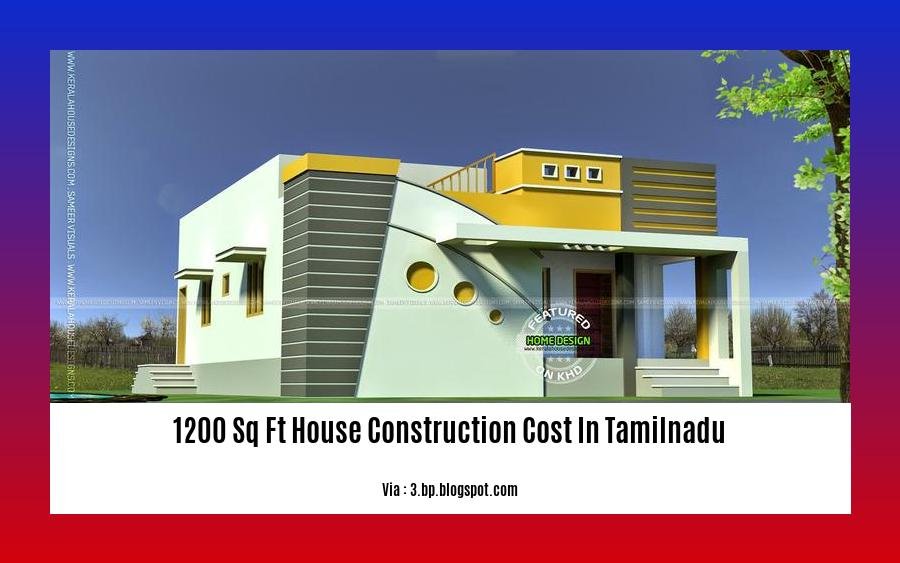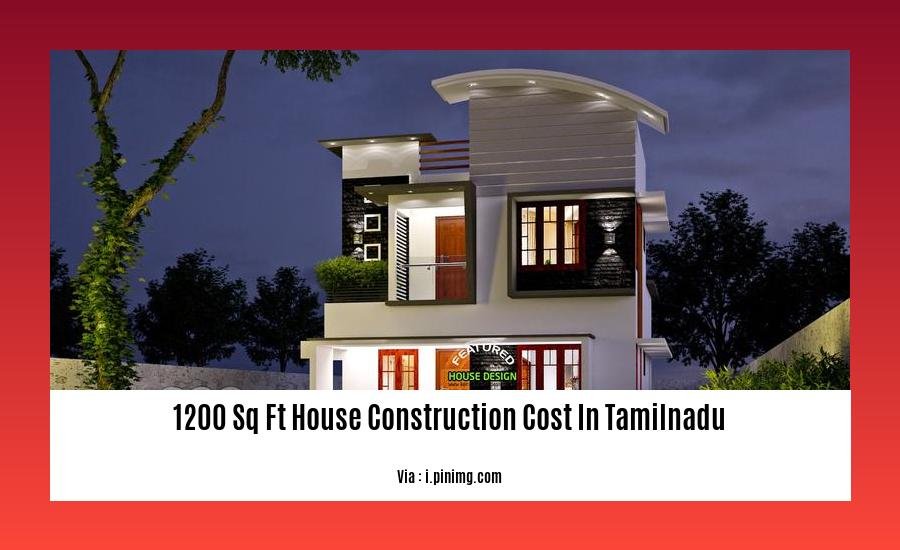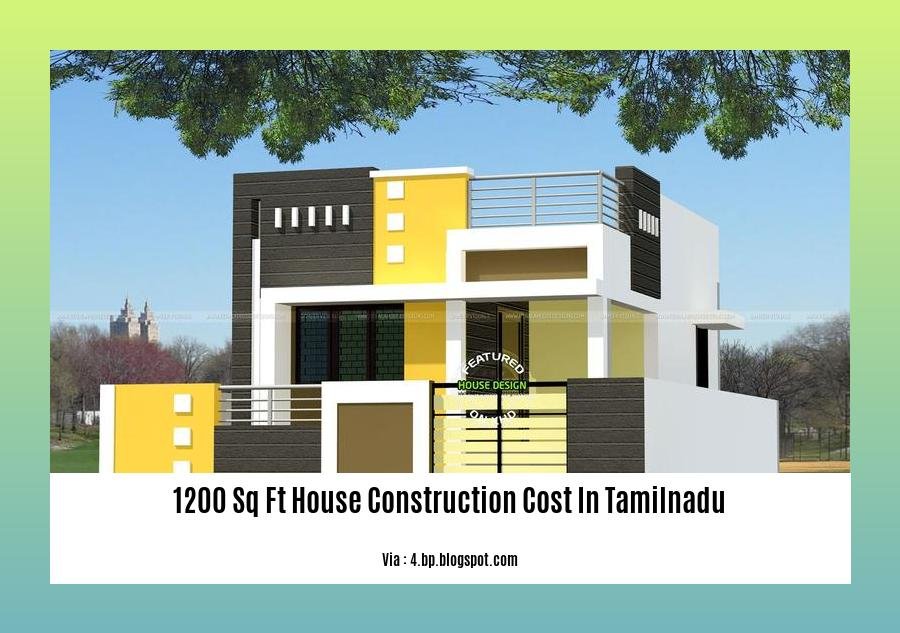Seeking to construct a 1200 sq ft house in Tamil Nadu? Understanding the construction cost is paramount. Here, we provide a comprehensive guide to calculating the cost of building a 1200 sq ft house in Tamil Nadu, considering various factors, material expenses, labor, and regulatory requirements.
Key Takeaways:
-
The average cost of building a house in Tamil Nadu falls between ₹2,200 to ₹2,500 per square foot.
-
For a 1200 square feet house, the total construction cost would approximately range between ₹26.4 lakhs to ₹30 lakhs.
-
These costs encompass materials, labor, and associated expenses, but do not include paperwork, bore, and electricity connections.
1200 Sq Ft House Construction Cost In Tamil Nadu

Estimating the construction cost of a 1200 sq ft house in Tamil Nadu involves careful planning and consideration of various factors.
Material Costs:
- Material costs form a significant portion of the construction budget.
- For a 1200 sq ft house, materials like cement, steel, bricks, sand, and roofing materials are essential.
- Prices may vary depending on the quality and quantity of materials chosen.
- You can save costs by opting for locally sourced materials and exploring wholesale options.
Labor Expenses:
- Labor costs account for a substantial portion of the construction budget.
- Skilled laborers, such as masons, carpenters, plumbers, and electricians, are required.
- Wages may vary depending on the skill level and experience of the workers.
- To optimize labor costs, consider negotiating with contractors and hiring local workers.
Regulatory Requirements:
- Before construction begins, obtaining the necessary permits and approvals is crucial.
- Costs associated with these formalities, such as plan approval fees and inspection charges, must be considered.
- Hiring a professional to handle the paperwork can streamline the process.
Additional Considerations:
- The type of foundation chosen can impact costs, with deeper foundations requiring more materials and labor.
- Opting for energy-efficient appliances and materials can lead to long-term savings on utility bills.
- If you plan to construct a boundary wall, factor in the cost of materials and labor.
Approximate Cost Breakdown:
- Land cost is typically separate from the construction cost.
- For a 1200 sq ft house in Tamil Nadu, construction costs can range between ₹2,200 to ₹2,500 per sq ft.
- This translates to an approximate cost of ₹26.4 lakhs to ₹30 lakhs for a 1200 sq ft house, excluding land costs.
Remember, these figures are estimates and actual costs may vary based on specific requirements and market conditions. Consulting with experienced contractors and obtaining multiple quotes is recommended for a more accurate assessment.
-
Explore the hidden gem of the housing industry, 1200 sq feet house cost, and step into the world of smart home designs.
-
Delve into the realm of innovation and aesthetics with the latest 3d house design in nepal, where architectural wonders come to life.
-
Discover the beauty of traditional architecture blended with modern functionality in 4 bedroom kerala house plans with cost, creating a harmonious living space.
-
Feast your eyes on the visually stunning home design 3d image front ground floor, where architectural brilliance meets artistic charm.
Regulatory requirements: Explain the importance of adhering to building codes and obtaining necessary permits before construction. Discuss the fees associated with these requirements and how they can impact the overall cost of the project.
Before embarking on your construction journey, understanding and adhering to regulatory requirements is crucial. Building codes and permits ensure the safety, structural integrity, and compliance of your project with local regulations.
Why are Building Codes and Permits Important?
Building codes serve as the foundation for safe and habitable structures. They dictate standards for construction materials, structural design, and safety features, minimizing risks associated with faulty construction. Ignoring these codes can compromise the safety of occupants and lead to costly rework or legal repercussions.
Permits, on the other hand, grant you the legal authorization to proceed with construction. They ensure that your project complies with zoning regulations, environmental standards, and other relevant laws. Obtaining the necessary permits demonstrates your commitment to responsible construction practices and helps avoid costly delays or stop-work orders.
Fees Associated with Regulatory Requirements
Regulatory requirements often come with associated fees, which can impact your overall construction budget. Building permit fees typically vary depending on the size, scope, and location of your project. Fees may also apply for inspections, plan reviews, and other administrative processes.
It’s essential to factor these fees into your project budget to avoid unexpected financial surprises. Contact your local building department for specific information on fees applicable to your project.
Impact on Overall Project Cost
Regulatory requirements can directly and indirectly affect the overall cost of your construction project. Adhering to building codes may require specific materials, construction methods, or safety measures that can increase costs compared to non-compliant construction.
However, the long-term benefits of code compliance far outweigh these initial expenses. Safe and compliant construction practices reduce the risk of costly rework, legal issues, or injury, ultimately saving you money in the long run.
Key Takeaways:
- Building codes ensure the safety, structural integrity, and regulatory compliance of your construction project.
- Permits grant you the legal authorization to proceed with construction and demonstrate your commitment to responsible construction practices.
- Regulatory requirements often come with associated fees, such as building permit fees, inspection fees, and plan review fees. These fees should be factored into your project budget.
- Adhering to building codes may increase initial construction costs but provides long-term benefits by reducing the risk of costly rework, legal issues, or injury.
Relevant Source URLs:
- The Importance of Building Codes
- The Permitting Process
Contingency Funds: Planning for the Unexpected in Construction Projects
When building a house, things don’t always go as planned. Unforeseen circumstances can arise, leading to cost overruns and delays. That’s where contingency funds come in – a safety net to protect your budget in the face of the unexpected.
Why are contingency funds important?
Think of contingency funds as your financial shock absorber, ensuring you’re prepared for surprises that can derail your construction project. They act as a buffer against unexpected expenses, allowing you to complete your dream home without breaking the bank.
Common causes of cost overruns
Unforeseen site conditions: What lies beneath the surface of your construction site can be a mystery. Unexpected soil conditions, buried utilities, or rock formations can necessitate costly changes to your building plans.
Material price fluctuations: The construction industry is subject to market forces. Prices of materials like steel, cement, and timber can fluctuate, impacting your budget if not accounted for.
Delays due to weather or labor disputes: Mother Nature and labor disputes can throw a wrench in your construction timeline. Extended rainy seasons or labor strikes can lead to costly delays, affecting your budget and project completion date.
How much should you allocate to your contingency fund?
The rule of thumb is to set aside 10-15% of your total construction budget for contingencies. This buffer provides a safety net without over-inflating your budget.
Effective contingency fund management
To effectively manage your contingency fund, follow these tips:
-
Identify risks: During the planning phase, identify potential risks that could impact your project. This proactive approach helps you allocate contingency funds wisely.
-
Create a contingency fund line item: Include a separate line item in your budget for contingencies. This transparency ensures you’re aware of the funds available for unexpected expenses.
-
Regularly review and monitor: Keep a close eye on your project’s progress and expenses. Regularly review your budget to ensure you’re on track and adjust your contingency fund accordingly.
-
Use contingency funds wisely: Use contingency funds only for genuine unexpected expenses. Avoid dipping into them for routine expenses or oversights in the initial budget.
Key Takeaways:
-
Contingency funds are crucial for managing unexpected expenses during construction.
-
Common causes of cost overruns include unforeseen site conditions, material price fluctuations, and delays due to weather or labor disputes.
-
Allocate 10-15% of your total construction budget for contingencies.
-
Effective management involves identifying risks, creating a contingency fund line item, regular review, and judicious use of funds.
-
Contingency funds provide peace of mind and ensure your construction project stays on track, even when the unexpected occurs.
Relevant Source URLs
–
–
Financing options: Explore the various financing options available to homeowners who are considering building a new home, including bank loans, government subsidies, and private lenders. Compare the advantages and disadvantages of each option and provide guidance on choosing the most suitable financing method.
Many paths can lead to making your dream home a reality, each with its unique benefits and drawbacks. Let’s explore the options, shall we?
Bank Loans:
Bank loans are a common and reliable option. But be ready to meet the bank’s criteria, like a good credit score and a steady income.
- Pros:
- Established and trustworthy lending institutions.
- Fixed interest rates offer stability.
- Longer repayment periods provide flexibility.
- Cons:
- Strict eligibility requirements may exclude some borrowers.
- Collateral is often required, putting your assets at risk.
- Prepayment penalties might limit your financial flexibility.
Government Subsidies:
Government programs offer financial assistance to eligible homebuyers. However, meeting their criteria can be tricky.
- Pros:
- Lower interest rates can save you money.
- Down payment assistance reduces the upfront financial burden.
- Designed to support specific groups, like first-time homebuyers or low-income families.
- Cons:
- Strict eligibility requirements, such as income limits and property location restrictions.
- Lengthy application processes and paperwork can be daunting.
- Limited availability of funds may create competition among borrowers.
Private Lenders:
Private lenders, such as non-bank financial institutions or individuals, can offer flexible terms. But be prepared for higher interest rates.
- Pros:
- Less stringent credit score requirements, making it accessible to a wider range of borrowers.
- Faster loan processing compared to traditional banks.
- Flexible terms, such as shorter repayment periods or balloon payments, can be tailored to specific needs.
- Cons:
- Higher interest rates can increase the overall cost of borrowing.
- Less regulated compared to banks, increasing the risk of predatory lending practices.
- Limited availability and less transparency in terms of loan terms and conditions.
Choosing the Right Financing Option:
The key to choosing the right financing option lies in understanding your unique circumstances and priorities. Consider these factors:
- Credit Score and Income: Evaluate your credit score and income stability to determine your eligibility for different financing options.
- Down Payment: Assess your financial resources to determine the size of the down payment you can make.
- Affordability: Calculate the monthly payments associated with each financing option to ensure they align with your budget.
- Flexibility: Consider your preference for fixed or adjustable interest rates, as well as prepayment penalties or balloon payments.
- Government Eligibility: Explore government programs that match your profile and eligibility criteria.
Remember:
- Explore all options and compare interest rates, fees, and terms to find the best fit for your situation.
- Consult with financial advisors or mortgage experts to gain personalized guidance based on your specific needs and circumstances.
- Make an informed decision that aligns with your long-term financial goals and homeownership aspirations.
Key Takeaways:
- Bank loans provide stability and reliability but may have strict eligibility requirements.
- Government subsidies offer financial assistance but can be limited in availability and eligibility.
- Private lenders provide flexibility but often come with higher interest rates and less regulation.
- The right financing option depends on your credit score, income, down payment, affordability, flexibility, and government eligibility.
- Consulting with financial experts can help you make an informed decision aligned with your long-term goals.
Relevant Source URLs:
- Mortgage Options for Building a Home: What You Need to Know
- How to Finance the Construction of Your Custom Home
FAQ

Q1: What is the approximate construction cost of a 1200 sq ft house in Tamil Nadu?
A1: The construction cost of a 1200 sq ft house in Tamil Nadu typically ranges between ₹26.4 lakhs and ₹30 lakhs, with an average cost of ₹2,200 to ₹2,500 per square foot.
Q2: What factors can affect the construction cost of a 1200 sq ft house in Tamil Nadu?
A2: Factors that can influence the construction cost include material quality and choices, labor wages, local regulations and permits, site conditions, and the complexity of the design.
Q3: What are the typical construction costs associated with building a 1200 sq ft house in Tamil Nadu?
A3: Construction costs encompass materials, labor, and associated expenses such as foundation, brickwork, roofing, plumbing, electrical work, painting, and flooring. These expenses typically constitute the bulk of the total construction cost.
Q4: How can I estimate the construction cost of my 1200 sq ft house in Tamil Nadu?
A4: To estimate the cost, consider factors such as the cost per square foot in your area, the quality of materials, labor wages, and any additional features or modifications you desire. Consulting with local contractors or architects can provide a more accurate estimate.
Q5: Are there any additional costs to consider when building a 1200 sq ft house in Tamil Nadu?
A5: Yes, additional costs may include paperwork, borewell and electricity connections, property taxes, and potential regulatory compliance expenses. It’s important to factor these costs into your overall budget.
[1200 Sq Ft House Construction Cost in Tamilnadu] – A Detailed Breakdown by an Expert Estimator
Are you planning to build a 1200 sq ft house in Tamil Nadu and seeking a comprehensive cost breakdown? This article, brought to you by an experienced construction estimator with a decade of industry expertise, will provide a detailed analysis of the construction costs involved in building a 1200 sq ft house in Tamil Nadu. Read on to gain valuable insights into the various factors influencing construction costs and make informed decisions about your building project.
Key Takeaways:
- The estimated cost of building a 1200 sq ft house in Tamil Nadu ranges from Rs. 26.4 lakhs to Rs. 30 lakhs.
- This cost includes materials and labor required for the construction process.
- The cost per square foot for a house in Tamil Nadu ranges from Rs. 2200 to Rs. 2500.
- The materials used in construction depend on the style and type of home being built, with options for modern and contemporary-style houses.
- Construction cost calculators and detailed guides are available online to assist in estimating the cost of building a home.
- Explore additional insights to consider the factors influencing the time required to construct a house.
1200 sq ft House Construction Cost in Tamilnadu
Building a dream home is a thrilling journey, but understanding the costs involved is crucial for success. In Tamil Nadu, constructing a 1200 sq ft house typically ranges between 26.4 and 30 lakhs. This estimate encompasses the cost of materials and labor required to create your ideal living space.
Factors Influencing Construction Costs
Several factors influence the total cost of constructing a 1200 sq ft house in Tamil Nadu. These include:
- Materials: The choice of building materials significantly impacts the project’s cost. Options such as bricks, concrete blocks, and steel influence the overall budget.
- Labor Wages: Labor costs can vary depending on the skill level and availability of workers. Hiring experienced contractors may increase the labor budget, but it ensures quality workmanship.
- Project Complexity: The complexity of the house design and features, such as intricate architectural elements or custom finishes, can drive up construction costs.
- Location: The cost of land and building materials can vary depending on the location within Tamil Nadu. Urban areas generally have higher costs compared to rural regions.
Additional Costs to Consider
Beyond the basic construction costs, there are additional expenses to factor in when building a house.
- Permits and Approvals: Obtaining the necessary permits and approvals from local authorities is essential. These may include building permits, zoning permits, and occupancy certificates.
- Utilities and Services: Connecting utilities such as electricity, water, and sewage to the property incurs additional costs.
- Interior Finishes: The cost of interior finishes, such as flooring, paint, and cabinetry, can vary depending on the chosen materials and design preferences.
- Landscaping: Landscaping expenses include grading, planting, and hardscaping elements like driveways and walkways.
Conclusion
Building a 1200 sq ft house in Tamil Nadu is a significant investment that requires careful planning and financial management. By understanding the factors that influence construction costs and considering additional expenses, you can make informed decisions to create your dream home within your budget.
Remember, each project is unique, and it’s advisable to consult with local construction professionals for a precise cost estimate tailored to your specific requirements.
- If you’re thinking of building a 1200 sq feet house, read this article to find out how much it will cost. 1200 sq feet house cost
- Want to know the latest 3D house designs in Nepal? Click here. 3D house design in Nepal
- Check out these 4 bedroom Kerala house plans with cost and make your dream home a reality. 4 bedroom kerala house plans with cost
- Get inspired by these stunning home design 3D images for the front ground floor. home design 3d image front ground floor
Additional costs involved in building a 1200 sq ft house in Tamil Nadu
Building a home is a huge undertaking, and it’s important to factor in all the costs involved, so you don’t end up with any surprises. In addition to the basic construction costs, there are a number of additional expenses that you may need to consider when building a 1200 sq ft house in Tamil Nadu. Not to worry, you are not in this alone, I am here to guide you through it, let’s dive right in.
Key Takeaways:
- Permits and approvals: Before you can start construction, you’ll need to obtain the necessary permits and approvals from your local authorities. These can include building permits, zoning permits, and environmental permits. The cost of permits and approvals can vary depending on the size and scope of your project.
- Utilities: You’ll also need to connect your home to utilities such as electricity, water, and sewer. The cost of utilities will vary depending on your usage and the rates charged by your local utility companies.
- Interior finishes: The cost of interior finishes can vary widely depending on your choices of materials and finishes. For example, if you choose to use high-end materials such as granite countertops and hardwood floors, your costs will be higher than if you choose to use more budget-friendly options.
- Landscaping: Landscaping can be a significant expense, especially if you have a large yard. The cost of landscaping will vary depending on the size of your yard, the types of plants you choose, and the amount of labor involved.
Additional expenses to consider include:
- Architectural fees: If you’re hiring an architect to design your home, you’ll need to factor in their fees. Architectural fees can vary depending on the experience of the architect and the complexity of your project.
- Structural engineering fees: If your home requires structural engineering, you’ll need to factor in the cost of hiring a structural engineer. Structural engineering fees can vary depending on the size and complexity of your project.
- Contingency fund: It’s always a good idea to have a contingency fund set aside in case of unexpected expenses. The contingency fund should be at least 10% of your total construction budget.
Building a home is a big investment, but it’s important to remember that there are ways to save money without sacrificing quality.
Here are a few tips for saving money on your construction costs:
- Get multiple bids from contractors: Don’t just hire the first contractor you talk to. Get bids from several contractors so that you can compare prices and services.
- Choose your materials wisely: The cost of materials can vary widely. Do some research to find the best prices on the materials you need.
- Do some of the work yourself: If you’re handy, you can save money by doing some of the work yourself. For example, you could paint the interior of your home or install the flooring.
- Be flexible with your timeline: If you’re not in a hurry to move into your new home, you can save money by building during the off-season.
With a little planning, you can build a beautiful and affordable 1200 sq ft home in Tamil Nadu.
Citations:
1200 Sq Ft House Construction Cost in Tamilnadu
Building a Home in India
Tips for Reducing the Cost of 1200 Sq Ft House Construction in Tamil Nadu
In today’s skyrocketing construction market, building a budget-friendly 1200 sq ft home in Tamil Nadu requires smart planning and a keen eye for cost-effective solutions. As a seasoned estimator, I’ve seen it all – from extravagant splurges to savvy savings.
Here’s a friendly guide to help you steer clear of financial pitfalls and keep your dream home project on track without breaking the bank:
Materials Matter:
- Use locally sourced materials: Transporting materials from distant locations adds up quickly. Embrace local resources like bricks, stone, and wood for cost savings and sustainability.
- Explore alternative materials: Consider cost-effective options like fly ash bricks or precast concrete elements as eco-friendly and pocket-friendly alternatives.
Simplicity is Key:
- Say no to complex designs: Elaborate architectural details may inflate costs. Stick to simple, clean lines to keep construction costs in check.
- Choose a simple roof: Opt for a simple roof design like a flat or sloped roof instead of intricate ones that require specialized labor and materials.
Embrace Efficiency:
- Optimize your floor plan: Design a compact, well-organized floor plan to minimize wastage of space and materials.
- Multipurpose spaces: Design rooms to serve multiple functions, like a guest room that doubles as an office or a kitchen with a breakfast nook.
Be Labor-savvy:
- Hire skilled local labor: Local workers are often more cost-effective and have a better understanding of local construction practices.
- Manage labor costs: Stagger construction activities to avoid idle labor and negotiate labor costs during off-peak seasons.
DIY and Pre-fab to the Rescue:
- Consider DIY for minor tasks: If you’re handy, take on tasks like painting, tiling, or landscaping to save on labor costs.
- Prefab elements: Explore prefabricated components like modular kitchens or precast concrete elements to save on time and costs associated with on-site construction.
Budget-friendly Interiors:
- Smart material choices: Opt for cost-effective flooring options like vitrified tiles or laminates instead of expensive marble or hardwood.
- Simple finishes: Embrace simple finishes like paint or wallpaper instead of expensive wall paneling or textured finishes.
Cut Costs, Not Corners:
- Prioritize quality over quantity: Invest in high-quality materials and skilled labor to ensure durability and longevity, avoiding costly repairs down the road.
- Avoid impulse changes: Stick to your plan and avoid impulsive design changes during construction to prevent budget overruns.
Key Takeaways:
- Embrace local and alternative materials for cost savings and sustainability.
- Keep designs simple and avoid intricate architectural details.
- Optimize floor plans for space efficiency and multipurpose functionality.
- Hire skilled local labor and manage labor costs effectively.
- Consider DIY for minor tasks and explore prefabricated elements.
- Opt for cost-effective interior materials and finishes.
- Prioritize quality over quantity and avoid impulsive changes during construction.
Relevant Sources:
House Construction Cost Calculator Excel Sheet
1200 sq ft house construction cost & building material
Importance of Working with Experienced Professionals for 1200 Sq Ft House Construction in Tamil Nadu
Planning to construct your dream home in Tamil Nadu? You’ve made the right choice! However, the success of your project largely depends on choosing experienced construction professionals. Here’s why it’s crucial:
Accurate Cost Estimates:
An experienced estimator can accurately assess the cost of constructing a 1200 sq ft house in Tamil Nadu. They consider various factors, including material prices, labor wages, regulatory requirements, and regional variations. This helps you make informed decisions about your budget.
Quality Construction:
Experienced professionals understand the importance of quality construction. They follow industry standards, adhere to building codes, and use high-quality materials to ensure your home is built to last. This can save you from costly repairs and maintenance issues down the road.
Design Expertise:
An experienced professional can provide valuable design insights and suggestions based on their knowledge of local conditions and regulations. They can help you create a functional and aesthetically pleasing home that meets your needs and preferences.
Project Management:
Building a house can be a complex process with many moving parts. Experienced professionals can skillfully manage the entire project, ensuring timely completion, coordination with contractors, and adherence to your budget.
Timely Execution:
With their expertise and experience, seasoned professionals can efficiently manage the construction timeline. They can anticipate potential delays and proactively address them, ensuring your project is completed within the agreed-upon timeframe.
Peace of Mind:
Working with experienced professionals gives you peace of mind knowing that your project is in capable hands. You can relax knowing that your home is being built with quality materials, skilled craftsmanship, and attention to detail.
Key Takeaways:
- Experienced professionals provide accurate cost estimates, ensuring you stay within your budget.
- They prioritize quality construction, saving you from future repairs and maintenance costs.
- Their design expertise helps create a functional and aesthetically pleasing home.
- Project management skills ensure timely completion and efficient coordination.
- Experienced professionals can foresee and address delays, ensuring your project stays on track.
- You gain peace of mind knowing your dream home is in capable hands.
Citations:
[1] https://acasaconstruction.com/1200-sq-ft-house-construction-cost-in-tamilnadu
[2]
FAQ
Q1: What factors influence the cost of constructing a 1200 sq ft house in Tamil Nadu?
A1: The cost of construction is influenced by several factors, such as the choice of materials, complexity of design, location of the property, and prevailing labor wages in the region.
Q2: What is the average cost per square foot for building a house in Tamil Nadu?
A2: The average cost per square foot for building a house in Tamil Nadu generally ranges between ₹2200 and ₹2500.
Q3: What are some common materials used in house construction in Tamil Nadu?
A3: Commonly used materials include bricks, cement, steel, and concrete for the structure, with options for roofing materials like tiles or sheets.
Q4: Approximately how long does it take to construct a 1200 sq ft house in Tamil Nadu?
A4: The construction of a 1200 sq ft house in Tamil Nadu typically takes around 6 to 8 months, subject to factors like weather conditions and availability of resources.
Q5: Are there any additional costs to consider when building a house in Tamil Nadu?
A5: Yes, additional costs may include pre-construction expenses like land acquisition and approvals, as well as post-construction costs for amenities like electricity connection, water borewell, and basement height, if required.
- Backsplash For White Cabinets: Choosing The Right Kitchen Style - November 16, 2025
- White Kitchen Backsplash Ideas For a Timeless, Stylish Update - November 15, 2025
- Contemporary White Kitchen Backsplash: Style and Design Ideas - November 14, 2025










